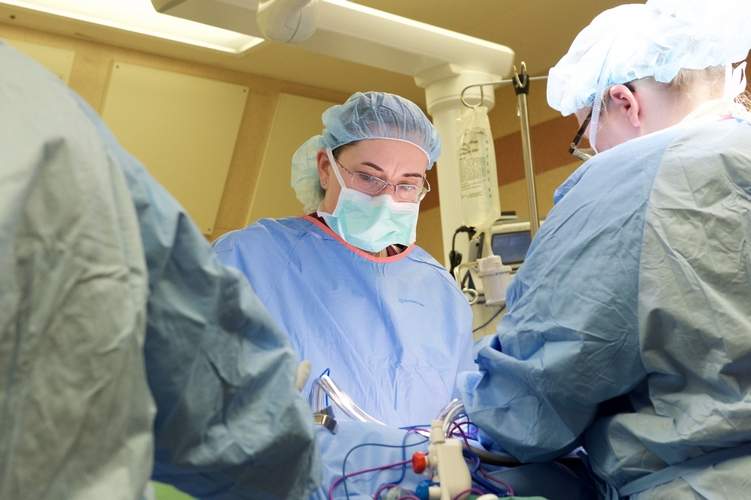By George C. Ford
The Gazette, Cedar Rapids, Iowa
WWR Article Summary (tl;dr) Two Iowa City entrepreneurs, Dalton Shaull and Eric Pahl, founders of HealthTech Solutions, are developing a mobile software system — ORGANIZER — to help improve communication and coordination for organ donor networks.
The Gazette, Cedar Rapids, Iowa
When a heart, kidney or other human organ becomes available for possible transplant, making the appropriate arrangements with transplant teams is critically important.
Often that can become a time-consuming process, according to Suzanne Conrad, CEO of the Iowa Donor Network in North Liberty.
“A portion of our work is extremely communication intensive, and currently it’s all done by cellphone,” Conrad said. “People on my end might repeat the same story nine or 10 times to different people all over the country. Even here in Iowa, the same information may need to be relayed numerous times.”
Two Iowa City entrepreneurs, Dalton Shaull and Eric Pahl, founders of HealthTech Solutions, are developing a mobile software system — ORGANIZER — to solve that problem by improving communication and coordination for organ donor networks.
Shaull is a recent University of Iowa human physiology graduate and Pahl is a UI biomedical engineering student.
Dr. Alan Reed, University of Iowa Transplant Center director, said if ORGANIZER is successful, it will improve the logistics of the organ transplant process.
“If there’s a donor in Iowa City, because of the way the (UNOS) algorithms are written, the heart is going to someone in Ohio, one lung may stay here and the other go to Nebraska, the kidneys may stay here and the liver may be shipped to Colorado,” Reed said. “What Pahl and Shaull are trying to do is come up with a communication tool to better organize the setting up of the various operating rooms and get everyone on the same page.
“As the complexity of allocating organs rises, this becomes challenging.”
Reed, who has advised Pahl and Shaull, said a transplant team may need more time to assemble or want to back out. Any changes need to be communicated to the remaining teams in real time, something Reed thinks will be possible with ORGANIZER.
The Iowa Economic Development Authority board in May 2016 approved $25,000 in Proof of Commercial Relevance Funding for HealthTech Solutions to test ORGANIZER at three organ procurement organizations — the Iowa Donor Network, LifeCenter Northwest in Bellevue, Wash., and LifeSource in Minneapolis.
Shaull and Pahl also have raised $400,000 from private investors. Many of those investors live in northwest Iowa and Minneapolis.
Pahl was able to make some valuable contacts in northwest Iowa in August 2015 when he participated in a program of the Okoboji Entrepreneurial Institute. The latter was launched by the UI John Pappajohn Entrepreneurial Center to provide students with a weeklong immersion into entrepreneurship and business strategy and develop an outstanding network of peers and business professionals.
“We also have been accepted to make a presentation to the Technology Commercialization Committee of the IEDA board for $100,000 of demonstration funding,” Shaull said. “We expect to open a $2 million Series A (initial round of venture-capital funding) in the third and fourth quarters of 2017.”
Conrad believes ORGANIZER can expedite communication when organ-procurement organizations such as the Iowa Donor Network have an organ available for transplanting.
“It would cut down on the duplication of effort and provide an actual log of communication,” Conrad said. “We don’t necessarily have that right now because everything is done verbally. It’s not always done on recorded phone lines.
“At the same time that people are on the phone conveying the information verbally, we’re also relying on them to type it into a donor database. This would provide another set of records of various communications transactions.”
Candidates for a transplant are listed by category on a national database maintained by the United Network for Organ Sharing (UNOS) in Richmond, Va. When a patient is added to the list, a transplant hospital adds their medical information to the UNOS computer system.
When a deceased organ donor is identified, UNOS’s computer system uses a set of algorithms to generate a ranked list of transplant candidates, or matches, based on blood type, tissue type, medical urgency, waiting time, expected benefit, geography and other medical criteria. Celebrity or financial status are not factors in obtaining a transplant.
Conrad said it can be 24 to 36 hours from the time a donor has experienced brain death and the family has given permission for the organ to be removed until that organ is ready for transplanting in an operating room.
“Families (of organ recipients) ask us why it takes so long,” Conrad said. “There is a lot of work that has to be done in terms of determining where the organ needs to go and which patient has the greatest need.”
The Iowa Donor Network has agreed to start piloting ORGANIZER on Dec. 1 in a live setting, Shaull said. It will operate in parallel with the existing system of verbal communication.
Shaull said ORGANIZER will be provided as software as a service for a fee to organ-procurement organizations. The data will be encrypted and secure as required by federal law — something not always possible when information is being related verbally over cellphones.
“With data, there will be opportunities to mature that revenue model into something that’s more transactional,” he said.
While organ procurement organizations are expected to be the primary clients for ORGANIZER, they do not have the financial resources to invest in the development of the product.
Conrad said the Iowa Donor Network, LifeCenter Northwest, LifeSource and other organ-procurement organizations operate as not-for-profits that rely on Medicare funding.
“We do not have deep pockets,” she said. Pahl and Shaull “are definitely looking for venture capital, other sources of funding and financial backers. It’s not going to be us.”














































































































































































































































































































































































